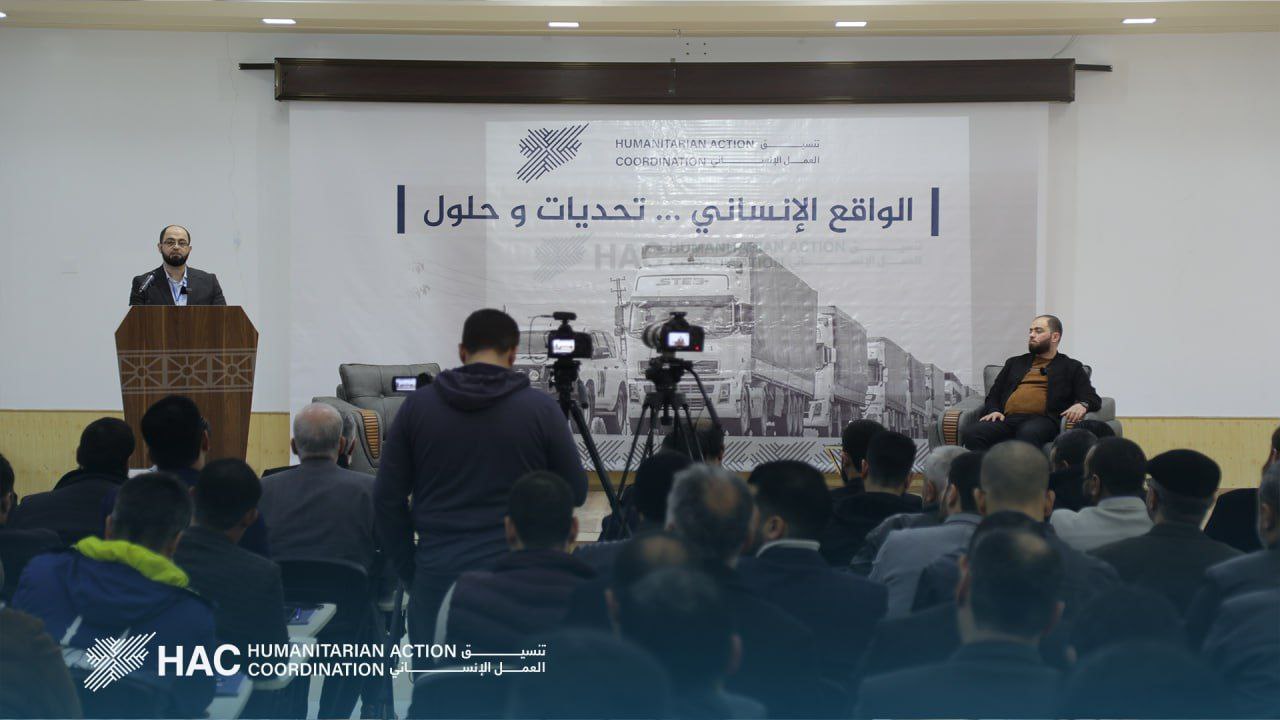
The Humanitarian Action Coordination Office (HAC) a non-profit Syrian institution based in Idlib, northern Syria, hosted a conference titled “Humanitarian Reality: Challenges and Solutions,” today, December 25. The gathering highlights the dire situation faced by the Syrian people due to the ongoing conflict and displacement.
According to HAC’s Director of Communication Platforms Amer al-Alwa, the conference aimed to address the pressing humanitarian issues arising from the displacement of millions of Syrians and the lack of adequate protection from the harsh winter weather conditions in camps.
Al-Alwa told the press that the Syrian revolution and subsequent attacks by Assad and his allies have led to widespread displacement, with millions forced to seek refuge in overcrowded camps lacking essential resources. The impact of the conflict has not only been felt through military means but also through the obstruction of aid delivery, exacerbating the suffering of the displaced population.
The intervention of various UN agencies, including the World Food Program (WFP), has been crucial in providing aid to those in need. However, the aid provided has faced significant challenges, with a notable reduction in aid volume in June 2023, reaching only 50% of the previous level. This reduction has raised concerns about the worsening humanitarian situation and food insecurity in the region.
The abrupt announcement of a halt to most food aid to northwestern Syria, due to a lack of funding, has sparked fears of a humanitarian catastrophe. The decision has been met with strong opposition from those in the region, with calls for the UN to take decisive action in finding solutions to the crisis and mobilizing support for the Syrian people.
There have been popular protests and a petition signed by IDPs in northern Syria imploring the organization and international community to take immediate action. The impact of these developments has been underscored by the onset of winter, which poses additional challenges for the displaced population.
The aid cut will directly affect vulnerable populations, including IDPs and those living in camps. The reduction is likely to lead to increased food prices and therefore to further increasing difficulties for families to access essential food items. This will likely result in increased food insecurity and heightened levels of hunger and malnutrition, particularly among children, the elderly, and vulnerable individuals.
The urgency of the situation has prompted efforts to engage with international delegations to convey the extent of the need and the difficult living conditions faced by the Syrian people, just this past year the office met with over 150 international delegations. These efforts aim to garner support and assistance for humanitarian work, emphasizing the importance of accurate statistics and facilitating the entry and exit of delegations to address the crisis effectively.
The conference, which was attended by members of the Syrian Salvation Government (SSG) government, notable revolutionary figures and representatives of various humanitarian organizations working in northern Syria, served as a platform to highlight the critical need for immediate action to alleviate the suffering of the displaced population in Syria. It underscored the urgency of finding sustainable solutions and securing adequate support to address the humanitarian challenges faced by the region. The collective efforts of the international community, UN agencies, and humanitarian organizations are essential in mitigating the impact of the crisis and providing vital assistance to those in need.









